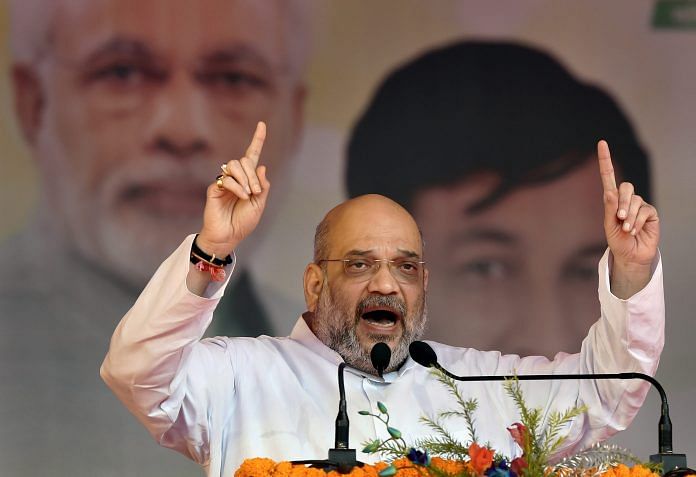Issue of Bangladeshi immigrants has been central to BJP’s agenda, and helped party score its first win in the northeast in 2016 Assam assembly elections.
New Delhi: International NGO Human Rights Watch has joined the chorus of criticism triggered by Bharatiya Janata Party (BJP) president Amit Shah’s analogy between illegal immigrants from Bangladesh and termites.
“The president of India’s ruling party crosses a disturbing line & well-known line,” tweeted Andrew Stroehlein, the European media director of Human Rights Watch.
Also read: For BJP, NRC has become the national register of convenience
“The path to genocide & other mass atrocity crimes is always 1st paved by powerful politicians using dehumanising language of ‘termites’, ‘cockroaches’ or ‘vermin’,” Stroehlein added.
The president of India's ruling party crosses a disturbing & well-known line.
The path to genocide & other mass atrocity crimes is always 1st paved by powerful politicians using dehumanising language of "termintes", "cockroaches" or "vermin".
Always. https://t.co/mKAw56KWHZ pic.twitter.com/aSs4gMyd5p
— Andrew Stroehlein (@astroehlein) September 23, 2018
Stroehlein was referring to the fact that similar terms were employed by Nazi Germany as it set out to exterminate Jews during the Second World War, calling the community “rats”.
During the Rwandan genocide of 1994, where hundreds of thousands of Tutsis were butchered, the minority community was repeatedly referred to as “cockroaches”.
‘Will be ejected one by one’
Condemnation was quick to follow Shah’s rally Sunday in New Delhi, as he used the termite analogy to make yet another pitch against illegal immigration from Bangladesh in India’s eastern border states, an emotive issue for local residents.
“These crores of illegal immigrants are like termites and they are eating the grain that should go to our poor and they are taking our jobs,” The Telegraph quoted Shah as saying. “They carry out blasts in our country and so many of our people die.”
The India arm of another international NGO, Amnesty, had called Shah out for the “dehumanising” analogy too.
Even before the #NRC process is over, it is horrific to hear @AmitShah dubbing Bangladeshi migrants as "termites".
Dear Mr Shah, please STOP dehumanising people, irrespective of them being in the NRC list or not.#HumanRights for all ?????????? https://t.co/vcdwNs1q0t
— Amnesty India (@AIIndia) September 24, 2018
Speaking to The Hindu, Bangladesh information minister Hasanul Haq Inu questioned Shah’s locus standi, but said the country will not take up the issue with India since it was not an official statement from the government.
Even so, he said the remark was “unwanted and improper”.
The issue of Bangladeshi immigrants has been central to the BJP’s agenda for a long time, and helped the party score its first win in the northeast in the 2016 Assam assembly election. During his visit to Assam in November 2014, PM Modi had promised that he will make arrangements to stop the influx of illegal Bangladeshi immigrants.
The rhetoric has intensified in the wake of the recent National Register of Citizens (NRC) exercise, where the first draft did not include 40 lakh residents of Assam.
Although the government has been at pains since to urge patience, saying the first draft was not the final word on citizenship, Shah has repeatedly raked up the issue at public rallies.
Addressing a public meeting in Gangapur, Rajasthan, Saturday, Shah said illegal immigrants will be “struck off the electoral rolls”. “BJP sarkaar ek-ek ghuspaithiye ko chun-chun kar matdata suchi se hatane ka kaam karegi,” said Shah.
Two weeks ago, on 11 September, he said in Jaipur that the BJP will expel each illegal Bangladeshi immigrant.
“Bharatiya Janata Party ka sankalp hai, ek bhi Bangladeshi ghuspethiya desh mein rehne nahi denge, chun chun kar nikal denge (BJP won’t let even one Bangladeshi infiltrator stay in the country… We will pick out each one and expel them),” Shah had said.
In an address to party workers in Bhopal Tuesday, he said the process of evicting “illegal infiltrators will not stop”.
BJP general secretary Ram Madhav, however, had told ThePrint in an interview last month that the procedure of deportation is a long-drawn one.
Also read: Amit Shah calls them ‘ghuspethiye’. It’s just a divisive ploy ahead of elections
The 40 lakh people who have been left out of the NRC first draft, published on 31 July, will have two months to raise their grievances. After they file fresh documents, a verification exercise will begin and last another three to four months.
Only when the final NRC is out will people be formally referred to as “foreigners”. Even then, they will have the provision to appeal in the Foreigners’ Tribunal. If they are not satisfied, they can appeal in the high court and so on, Madhav had explained.




Ghuspetiya is nothing but to cover up “goose (bribe)” petian (boxes) which the parties have been getting during Diwali 🙂